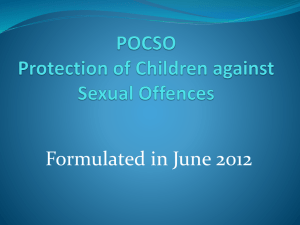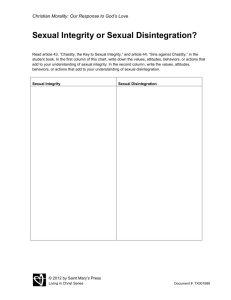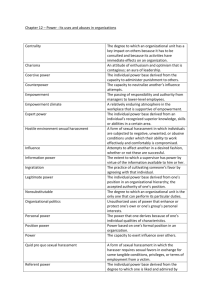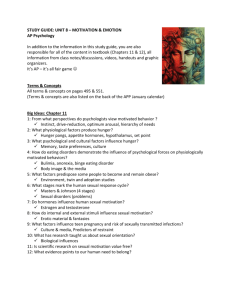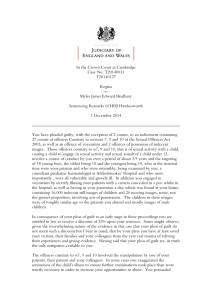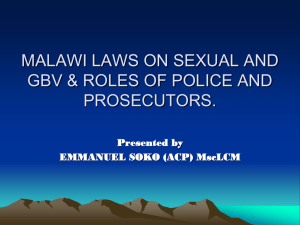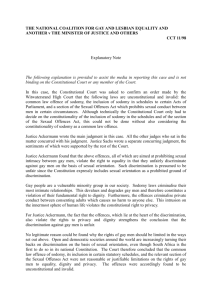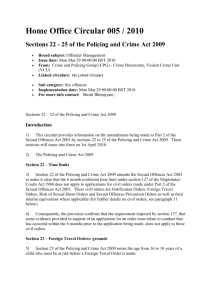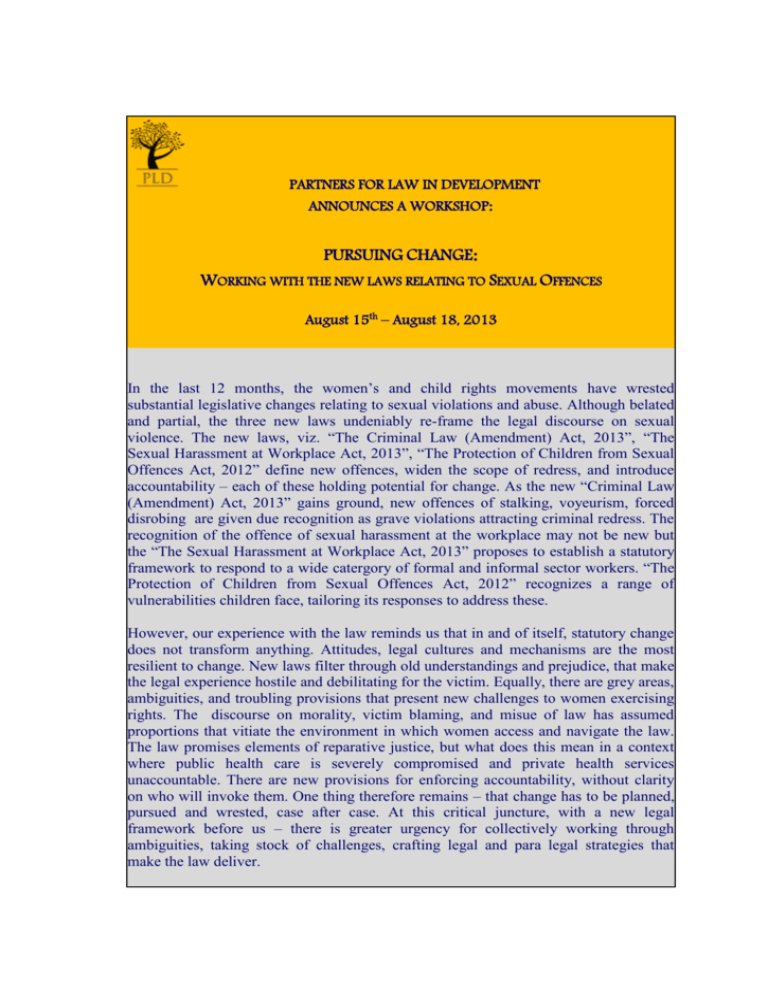
PARTNERS FOR LAW IN DEVELOPMENT
ANNOUNCES A WORKSHOP:
PURSUING CHANGE:
WORKING WITH THE NEW LAWS RELATING TO SEXUAL OFFENCES
August 15th – August 18, 2013
In the last 12 months, the women’s and child rights movements have wrested
substantial legislative changes relating to sexual violations and abuse. Although belated
and partial, the three new laws undeniably re-frame the legal discourse on sexual
violence. The new laws, viz. “The Criminal Law (Amendment) Act, 2013”, “The
Sexual Harassment at Workplace Act, 2013”, “The Protection of Children from Sexual
Offences Act, 2012” define new offences, widen the scope of redress, and introduce
accountability – each of these holding potential for change. As the new “Criminal Law
(Amendment) Act, 2013” gains ground, new offences of stalking, voyeurism, forced
disrobing are given due recognition as grave violations attracting criminal redress. The
recognition of the offence of sexual harassment at the workplace may not be new but
the “The Sexual Harassment at Workplace Act, 2013” proposes to establish a statutory
framework to respond to a wide catergory of formal and informal sector workers. “The
Protection of Children from Sexual Offences Act, 2012” recognizes a range of
vulnerabilities children face, tailoring its responses to address these.
However, our experience with the law reminds us that in and of itself, statutory change
does not transform anything. Attitudes, legal cultures and mechanisms are the most
resilient to change. New laws filter through old understandings and prejudice, that make
the legal experience hostile and debilitating for the victim. Equally, there are grey areas,
ambiguities, and troubling provisions that present new challenges to women exercising
rights. The discourse on morality, victim blaming, and misue of law has assumed
proportions that vitiate the environment in which women access and navigate the law.
The law promises elements of reparative justice, but what does this mean in a context
where public health care is severely compromised and private health services
unaccountable. There are new provisions for enforcing accountability, without clarity
on who will invoke them. One thing therefore remains – that change has to be planned,
pursued and wrested, case after case. At this critical juncture, with a new legal
framework before us – there is greater urgency for collectively working through
ambiguities, taking stock of challenges, crafting legal and para legal strategies that
make the law deliver.
With this in mind, PLD is organizing a training workshop on the new laws, on
August 15th, 16th, 17th and 18th (arrival on August 15) This workshop seeks to take
stock of and interrogate the recent developments in laws on sexual offences, structured
to address common themes as well as each law distinctly. The discussion would
include:
Gaining clarity on the three laws: the new offences, their scope, potential and limits
Sharing legal/ paralegal strategies and experiences regarding our engagements with
the new laws
Strategies for working through institutional inertia, morality discourses, victim
blaming and counter-charge of malicious prosecution
Understanding challenges specific to the application of these laws in different
contexts
Sharing, disseminating and receiving feedback on information material and
resources on the new laws
Planning future initiatives
This workshop will focus on strategies and application. All participants will be expected
to bring with them examples of challenges they navigated and successful strategies to
contribute towards collective learning. This part of a series of initiatives by PLD on
sexuality, sexual violence and the law, to discuss, question, reflect and learn together.
All those interested in participating may apply.
Who may apply -The workshop is open to activists with atleast 3 years of experience
as lawyers, paralegals, social workers, academics and counselors. Affiliation to an
organization or collective activism is desirable but not necessary. The workshop can
accommodate about 25 participants. The resource pool will comprise of lawyers,
researchersand academics with a background of activism on various facets of sexual
violence.
Workshop dates: 15th August, 2013- 18th August 2013
Registration Fee: A registration fee of Rs 1000 will be charged from participants.
Application form attached. Last date for applying: 31st July 2013
The form can also be downloaded from the website of www.cedawsouthasia.orgor
www.pldindia.org.
Please
send
your
completed
applications
to trainings@pldindia.org .
Partners for Law in Development
F-18, First Floor, Jangpura Extension
New Delhi- 110014
Tel. No.: 011- 24316832 / 33
Telefax: 011- 24316833
Email: trainings@pldindia.org
Website: http://www.pldindia.org, http://cedawsouthasia.org/



